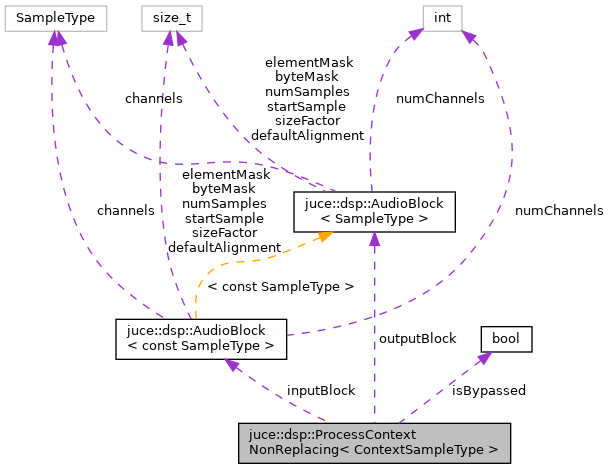Contains context information that is passed into an algorithm's process method. More...
#include <juce_ProcessContext.h>

Public Types | |
| using | AudioBlockType = AudioBlock< SampleType > |
| The type of audio block that this context handles. More... | |
| using | ConstAudioBlockType = AudioBlock< const SampleType > |
| using | SampleType = ContextSampleType |
| The type of a single sample (which may be a vector if multichannel). More... | |
Public Member Functions | |
| ProcessContextNonReplacing (const ConstAudioBlockType &input, AudioBlockType &output) noexcept | |
| Creates a ProcessContextNonReplacing that uses the given input and output blocks. More... | |
| ProcessContextNonReplacing (const ProcessContextNonReplacing &)=default | |
| ProcessContextNonReplacing (ProcessContextNonReplacing &&)=default | |
| const ConstAudioBlockType & | getInputBlock () const noexcept |
| Returns the audio block to use as the input to a process function. More... | |
| AudioBlockType & | getOutputBlock () const noexcept |
| Returns the audio block to use as the output to a process function. More... | |
Static Public Member Functions | |
| static constexpr bool | usesSeparateInputAndOutputBlocks () |
| All process context classes will define this constant method so that templated code can determine whether the input and output blocks refer to the same buffer, or to two different ones. More... | |
Public Attributes | |
| bool | isBypassed = false |
| If set to true, then a processor's process() method is expected to do whatever is appropriate for it to be in a bypassed state. More... | |
Private Attributes | |
| ConstAudioBlockType | inputBlock |
| AudioBlockType & | outputBlock |
Contains context information that is passed into an algorithm's process method.
This context is intended for use in situations where two different blocks are being used the input and output to the process algorithm, so the processor must read from the block returned by getInputBlock() and write its results to the block returned by getOutputBlock().
@tags{DSP}
| using juce::dsp::ProcessContextNonReplacing< ContextSampleType >::AudioBlockType = AudioBlock<SampleType> |
The type of audio block that this context handles.
| using juce::dsp::ProcessContextNonReplacing< ContextSampleType >::ConstAudioBlockType = AudioBlock<const SampleType> |
| using juce::dsp::ProcessContextNonReplacing< ContextSampleType >::SampleType = ContextSampleType |
The type of a single sample (which may be a vector if multichannel).
|
inlinenoexcept |
Creates a ProcessContextNonReplacing that uses the given input and output blocks.
Note that the caller must not delete these blocks while they are still in use by this object!
References juce::gl::input, jassert, and juce::gl::output.
|
default |
|
default |
|
inlinenoexcept |
Returns the audio block to use as the input to a process function.
References juce::dsp::ProcessContextNonReplacing< ContextSampleType >::inputBlock.
|
inlinenoexcept |
Returns the audio block to use as the output to a process function.
References juce::dsp::ProcessContextNonReplacing< ContextSampleType >::outputBlock.
|
inlinestaticconstexpr |
All process context classes will define this constant method so that templated code can determine whether the input and output blocks refer to the same buffer, or to two different ones.
|
private |
| bool juce::dsp::ProcessContextNonReplacing< ContextSampleType >::isBypassed = false |
If set to true, then a processor's process() method is expected to do whatever is appropriate for it to be in a bypassed state.
|
private |